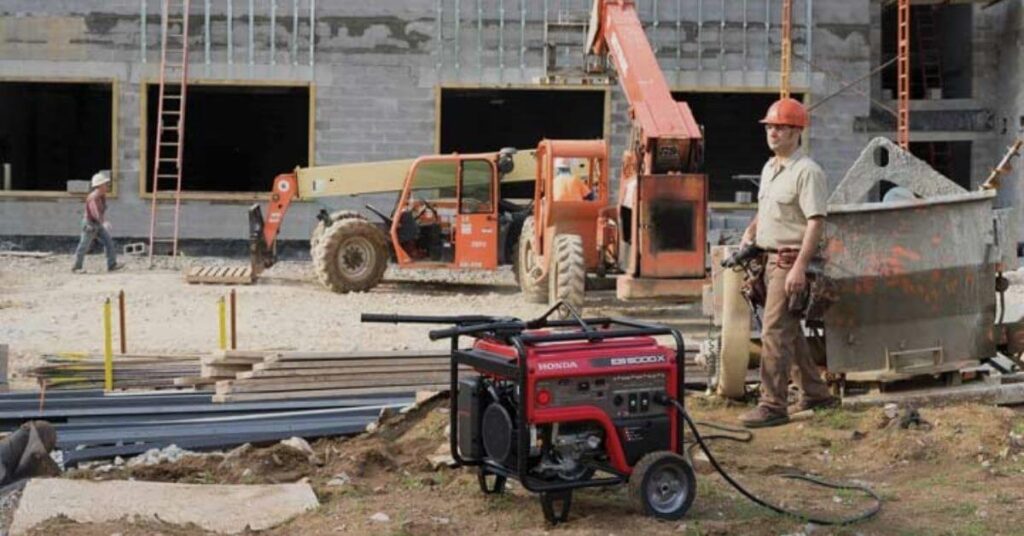In construction, a strong generator is essential for equipment and tool operation However, selecting the right generator size can be a daunting task. The size of the generator you need will depend on the type and number of tools and equipment you plan to use on the construction site.

Whether it’s powering a large saw or running multiple lights and power tools, it’s important to choose a generator that can handle the demand. Our team is here to guide you in selecting the right generator for your specific needs, so you can focus on the job at hand.
Why is it Important to Choose the Right Size?
. By doing your research and determining the right size generator upfront, you can save yourself from potential problems and ensure that your generator runs smoothly and lasts longer. Furthermore, it will provide you and your team with a safer working environment.”
Things Need To Consider Before Choosing The Generator For Your Construction Site
your equipment and tools. By taking the time to evaluate your specific requirements and choosing a generator that is best suited for your construction site, you can ensure that your equipment runs smoothly and safely, and that your generator lasts for years to come.”
1. Wattage Requirement
Calculate total wattage needed by adding up equipment/tools to determine generator size for construction site.
1. Extra-Large Generators
Determining the appropriate generator size for your project requires a thorough assessment of the total wattage needed to power all the electrical equipment and tools that will be in use.
It’s important to take into account not only the running wattage, but also the starting wattage of any tools that have high power requirements.
To ensure your generator has sufficient power, it’s recommended to add an additional 10 percent to your final total wattage calculation as a safety margin. “
2. Size of the Generator
“When it comes to selecting the right generator for your project, there are a range of options available. From Medium generators, capable of supplying power within a certain range, to Large generators, Extra-Large generators, and even industrial-grade options.
Each generator type offers different wattage capabilities, making it essential to determine the specific power requirements for your project before making a selection.”
2.1 Medium Generator
Medium generators, for instance, offer a power output range between 3,000 and 5,000 watts, which may seem limited, but can still power a variety of equipment.
This type of generator is often a popular choice for those looking for a reliable backup power source, as it is capable of powering essential household appliances such as refrigerators and furnace fans in case of an emergency.
This type of generator may be suitable for you if you are looking for a portable and compact generator for your job site.”
2.2 Large Generator
Big generators, capable of 6k-9k watt output, are suitable for powering multiple rooms or heavy-duty tools at large construction sites.
If you anticipate needing 6,000 watts or more to power your equipment and appliances, a large generator would be a good choice to ensure that all of your tools and equipment function seamlessly.
This type of generator is a popular option for those who require a reliable and robust power source for their construction projects. So, it is a good choice for construction sites that utilize a lot of power tools.”
2.3 Extra-Large Generator
“Extra-large generators are designed to deliver an impressive power output of over 10,000 watts, making them capable of powering a wide range of energy-intensive appliances and tools.
From air conditioners, refrigerators to electric pumps, these generators are built to handle heavy loads.
If you’re planning to use energy-consuming tools on your job site, an extra-large generator would be an ideal choice.
It’s also worth considering if you’re unsure about the exact wattage requirements for your project, as going for a larger size ensures that you have the necessary power to complete your project successfully. So, it may be wise to choose a larger generator size if you want to ensure your project is powerful enough.”
2.4 Industrial Generator
“When it comes to powering heavy-duty equipment and tools, an industrial-sized generator is often the best choice. These generators are specifically designed to handle high-power requirements, and are built to operate 24/7, making them ideal for companies and businesses that require a reliable and consistent power source.
An industrial-sized generator may be a good option for you if your tools require a lot of power, or if they need to be running continuously.
These generators are often used by large companies to keep their operations running smoothly during power outages, and provide ample power for various business needs. With its heavy-duty capabilities, it’s a perfect choice for industries that require a lot of power. “
Other Factors Should Also Be Ponder Size of the Site
“As the size of your construction site increases, so does the power demand for your generator. Larger construction sites may require multiple generators to ensure all equipment and tools are properly powered, as the energy needs of a big project are generally higher than that of a smaller one.
This is due to the fact that more tools, appliances, and equipment need power to function, and the size of the area that needs to be powered is also greater. It’s important to keep in mind that the bigger your construction site is, the more generators it may require to meet the power demands of the project.”
1. Types of Equipment
“When working on construction projects that involve heavy tools and equipment, it’s essential to have a generator that can handle the high power demands. Opting for a generator with a higher wattage is generally a better choice than one with a lower wattage,
As it will be able to provide the necessary power to keep all equipment and tools running efficiently. A generator with a higher wattage will also have more capacity to handle unexpected power spikes, which can be vital when working with heavy-duty equipment and tools.
So, for heavy-duty construction projects, choosing a generator with a higher wattage ensures that your tools and equipment have the power they need to function properly.”
2. Reserve Power
“When equipment is turned on, it typically uses more electricity than when it is simply running. This is known as a power surge, and it can put a significant strain on your generator if you are starting multiple machines or tools at the same time.
It’s essential to ensure that your generator can handle the power demands of these surges, as it can prevent damage to the generator and equipment.
When working on a construction site, it’s important to consider the power needs of all equipment and tools, including the power surges that occur when they are turned on.
By ensuring that your generator can handle these power surges, you can protect your equipment and tools, and ensure that they are running at peak performance.
So, it’s important to take into account power surges when selecting a generator for your construction site to ensure that it can handle the power demands of all your tools and equipment.”
3. Phase
Generator type is crucial for construction project success. Generators are available in both single and three-phase configurations, with the latter being more suitable for construction projects due to its ability to deliver a more reliable and stable power supply.
Three-phase generators are designed to handle heavy loads and provide a consistent power supply, making them ideal for construction sites where tools and equipment are in constant use.
They are also less likely to experience power fluctuations, which can be detrimental to the performance of tools and equipment. This can help to avoid costly downtime and ensure that the project is completed on time and within budget.
So, if you are looking for a generator for your construction project, it’s worth considering a three-phase generator, as it can deliver a more reliable and stable power supply that is essential for construction projects.”
FAQs
Why do construction sites use generators?
“Generators are an essential component of any construction site. They provide a reliable source of electrical power for a wide range of applications, including lighting, equipment, and even the temporary office trailer.
The use of generators on construction sites allows for flexibility and convenience. They can be moved around the site as needed, and can provide power to different areas as the construction progresses. This helps to ensure that work can continue even in areas where there is no access to the main power grid.
In addition, generators can also be used as a backup power source in case of power outages, allowing work to continue without interruption. This can be especially important for projects with tight deadlines, as any delay can cause significant financial losses.
So, a generator can be a versatile tool to have on a construction site, it can power various equipment, tools and even provide electricity for site office and lighting, ensuring that the project can continue smoothly and efficiently.”
Which generators are best for construction work?
However, some models stand out for their performance and durability. Here are a few options that are considered to be among the best generators for construction:
Champion Power Equipment 100813 Portable Generator: This generator is known for its powerful performance and easy portability, making it ideal for construction sites. It has a peak power of 9,375 watts and a running power of 7,500 watts, making it suitable for powering a variety of tools and equipment.
DuroMax XP8500E Portable Generator: This generator is another top-performing option that is well suited for construction sites. With a peak power of 8,500 watts and a running power of 6,750 watts, it can handle heavy loads and provide a consistent power supply.
Cat RP7500E 502-3690 Portable Generator: This generator is built to withstand the rigors of a construction site and is known for its durability and reliability. It has a peak power of 7,500 watts and a running power of 6,250 watts, making it suitable for powering a wide range of tools and equipment.
Generac 7676 GP8000E Portable Generator: This generator is powerful and efficient, making it a great option for construction sites. It has a peak power of 8,000 watts and a running power of 6,500 watts, making it suitable for powering a wide range of tools and equipment.
These generators are considered to be among the best for construction sites, due to their powerful performance and durability. However, it’s always important to consider the specific power needs of your project before making a final decision.
What size generator for an office trailer?
“When calculating the power needs for a construction site, it’s important to consider the wattage requirements of all the equipment and appliances that will be in use. For example, the wattage needed for an A/C unit can vary depending on its size.
Typically, an A/C unit requires between 1500 and 1800 watts to function properly. Similarly, the wattage consumption of fluorescent lights is relatively low, between 300 and 400 watts per light depending on the number of lights in use in the trailer.
It’s also worth noting that the wattage consumption of different tools and equipment can vary depending on the brand, model, and size.
Therefore, it’s important to consult the manufacturer’s specifications for the exact wattage requirements of each piece of equipment. With this information, you can determine the total wattage needed and then select the appropriate generator size for your construction site.”
Conclusion
Reliable power source is crucial for smooth equipment/appliance operation in construction projects. Generators are a go-to solution for providing this power, but with so many different sizes and options available, choosing the right one can be a daunting task.
To make the decision easier, it’s important to consider factors such as the total wattage needed for all equipment and appliances, the power surge requirements of starting multiple machines or tools at the same time, and the specific needs of your construction site, whether it’s a single-phase or three-phase configuration.
Additionally, the size of the construction site also plays a role in determining the size of the generator required. Larger construction sites may require multiple generators to ensure that power is distributed evenly and efficiently.
By taking into account all of these factors, you can choose the perfect generator size that will keep your construction site running smoothly and effectively. So, now you know what size generator you need for a construction site.”




